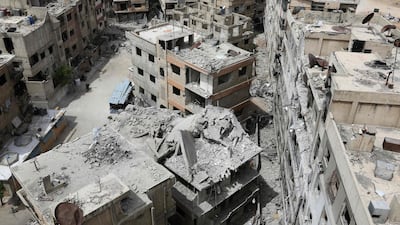Inspectors from the Office for the Prohibition of Chemical Weapons (OPCW) were still seeking access to the site of a chemical attack in Douma, a suburb of Damascus, on Wednesday after reports emerged that a United Nations security team conducting reconnaissance came under gunfire a day earlier.
On Wednesday, OPCW Director General Ahmet Üzümcü told a closed-door meeting at the body’s Hague headquarters that shots were fired in the vicinity of the team on Tuesday as they visited the suburb to determine whether it was safe for inspectors to enter. Members of the security team were not injured and returned to Damascus after the incident.
The inspection team have been in Damascus since Saturday and initial reports had said they would begin their work on Sunday. But three days have passed without a clear indication of when they will be able to enter the attack site. An OPCW spokesperson declined to disclose operational details to The National.
The chemical attack reportedly killed dozens on April 7 in Douma, the eastern Damascus town now fully under Syrian government control after a years-long siege.
Syrian UN Ambassador Bashar Al Jaafari had said the fact-finding mission would begin its work in Douma on Wednesday if the UN security team deemed the situation there to be safe enough.
The Syrian government and its Russian allies say the attack was fabricated as a pretext to justify military strikes that were launched on Saturday by the United States, Britain and France.
Eliot Higgins, who runs Bellingcat, a research network that investigates conflicts, told The National that depending on the type of chemical used, the delays could hamper any investigation.
“Chlorine will disperse quickly, and it wouldn't be surprising to find trace signs of chlorine in a domestic environment as it's used in cleaning products,” Mr Higgins said.
“If a nerve agent was used, signs of that might be found in samples taken on the day of the attack, and maybe days afterwards.”
The United States accused Russia on Monday of blocking international inspectors from reaching the site of the poison gas attack. It said Russians or Syrians may have tampered with evidence on the ground. The French government agreed it was “highly likely” they had done so.
_______________
Read more:
Ambassador Haley: US will stay in Syria until it secures goals
Air strikes fail to destroy ‘heart’ of Syrian weapons programme: defector
Limited strikes, limited goals and no strategy on Syria
_______________
Earlier this week, journalists from various Syrian and international news organisations also visited the area with the permission of the Syrian government.
An Associated Press team visited the site on a Syrian government-organized tour Monday, including a two-room underground shelter where one resident said 47 people were killed, including his pregnant wife and two young daughters. Residents described the attack to the news agency as involving chlorine gas, but assigned blame for the attack to rebels who have now withdrawn from the area.
Former Douma residents now in northern Syria told The National anyone still in Douma was likely unable to speak freely for fear of retribution from the government.
The Syrian "White Helmets" rescue organization, which operates largely in rebel-held areas, said on Wednesday that it had pinpointed for international inspectors the places where the victims of the chemical attack are buried, its head Raed Saleh said on Wednesday.
Mr Saleh said bodies had been buried quickly because of heavy bombardment and the location of graves was kept secret to prevent any doctoring of evidence.
“Bodies might also contain signs of nerve agent use that could still be
present for a long time afterwards, but the more delays there are the less chance there is of finding them, and the more time the government and its allies has to hide evidence and intimidate witnesses,” Mr Higgins said.
The U.N.-mandated Independent International Commission on Syria has documented more than 30 chemical attacks in Syria between 2013 and the end of 2017 – at least 25 of them carried out by the Syrian military, the commission says. For the rest, it had insufficient evidence to determine the perpetrator. Most involved chlorine gas, usually causing only a few injuries.
In the southern suburbs of Damascus on Wednesday, Syrian government forces continued to shell neighborhoods held by ISIS, including parts of Yarmouk, the country’s largest Palestinian neighborhood. ISIS also maintains a presence in three other neighborhoods adjacent to Yarmouk.
There were also reports on Wednesday of fighters from the Jaish Al Islam rebel faction, known as the ‘Army of Islam,’ continuing to hand over their heavy and intermediate weapons in the Damascus suburb of Dumayr ahead of their departure to the northern town of Jarabulus.
Syrian state news agency SANA said a total of 5,000 people including 1,500 rebels were expected to leave the town.
They would join tens of thousands who have been transferred in recent weeks from rebel-held areas around Damascus to areas in northern Syria controlled by rebel groups.

